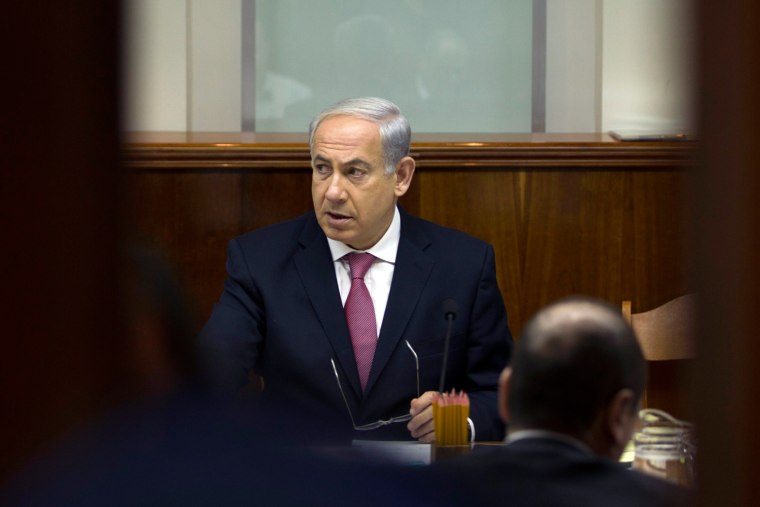Talks between Israeli and Palestinian negotiators — stalled for three years — are set to resume in Washington, D.C., this week, the State Department said in a news release on Sunday.
Teams of negotiators from the two countries have accepted invitations to “resume direct final status negotiations," according to the release.
According to a senior U.S. official, the meeting will take place over two days beginning Monday evening before an iftar dinner, a meal that breaks the day of fasting during Ramadan. Those meetings will tentatively lay a groundwork for further negotiations in the coming months, according to the release.
All meetings will take place at the State Department, the official said.
Justice Minister Tzipi Livni and Yitzhak Molcho will travel to the U.S. to represent Israel, while Chief Negotiator Saeb Erekat and Mohammad Shtayyeh will represent the Palestinians.
"Both leaders have demonstrated a willingness to make difficult decisions that have been instrumental in getting to this point. We are grateful for their leadership," Secretary of State John Kerry said in the statement.
News of the meetings came shortly after the Israel’s cabinet approved the release of 104 Palestinian prisoners on Sunday, whose freedom knocked aside a barrier for Palestinian President Mahmoud Abbas to come to the negotiating table.
"This moment is not easy for me, is not easy for the cabinet ministers, and is not easy especially for the bereaved families, whose feelings I understand," Israeli Prime Minister Benjamin Netanyahu said, referring to families who have lost members in militant attacks, according to Reuters.
"But there are moments in which tough decisions must be made for the good of the nation and this is one of those moments," Netanyahu said.
While in Amman, Jordan on July 19, Kerry told reporters that the two countries had begun to lay the groundwork to resume talks after months of intense shuttle diplomacy by America’s newly appointed chief diplomat.
"The representatives of two proud people today have decided that the difficult road ahead is worth traveling," Kerry said at the time.
On again, off again negotiations have taken place over the last two decades. U.S.-sponsored talks broke down in late 2010 over a disputed Israeli settlement construction in the West Bank and East Jerusalem, territories it captured in the 1967 Middle East War.
But the 13-7 vote, with two abstentions, by the Israeli government to release the prisoners cleared the way for peace talks to resume.
Netanyahu said on his Facebook page that the inmates would be freed only after talks began and would be released in groups based on the progress of the talks. Following the vote, hundreds of Israelis took to the streets to protest, including family members who lost loved ones killed by Palestinian militants.
Palestinians have long demanded the release of the prisoners who have been jailed in Israel since before 1993, when both countries signed an interim peace treaty known as the Oslo Accords.
Erekat commend Israel for setting in motion the steps to release the prisoners, but added that the move was well overdue.
"We call on Israel to seize the opportunity ... to put an end to decades of occupation and exile and to start a new stage of justice, freedom and peace for Israel, Palestine and the rest of the region,'' he said, according to Reuters.
The release of the prisoners gives Netanyahu flexibility to negotiate around other Palestinian demands, like stopping the expansion of Jewish settlements and the guarantee that talks over borders will be based on boundaries drawn before the 1967 Middle East war, when Israel took the West Bank, Gaza Strip, and East Jerusalem.
Israeli officials have insisted that the country be able to keep East Jerusalem and several settlement blocs as part of any peace deal.
Negotiations would likely take months to complete, and no more details about the framework of a possible deal have been released.
Also on Sunday, officials told NBC News that Martin Indyk, a former U.S. ambassador to Israel who now serves as director of the Foreign Policy Program at the Brookings Institution, will be named as the new Middle East envoy.
Indyk served in a variety of diplomatic roles during President Bill Clinton’s administration and has remained engaged with Arab leaders through his work at the Washington, D.C.-based think tank.
Indyk will likely take over much of the shuttling that Kerry, who has already visited the Middle East six times as secretary, has been tasked with to help facilitate talks between the Israelis and Palestinians.
NBC's Andrea Mitchell, Reuters and The Associated Press contributed to this article.
Related:
